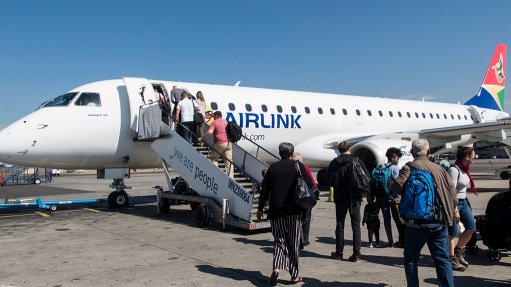
An Embraer E190 airliner of South African operator Airlink
Photo by: St Helena Tourism Authority
Brazilian major aerospace group Embraer, the world’s number one manufacturer of commercial jets with up to 150 seats, and the world’s number three commercial jet manufacturer, after Airbus and Boeing (in alphabetical order), has reported a net loss attributable to its shareholders of $292-million and an adjusted net loss (which omitted special items and deferred taxes and social contributions) of $104-million, for the first quarter of this year (1Q20). Embraer’s financial year is the same as the calendar year.
The company’s free cash flow was negative $676.5-million in 1Q20, in comparison to negative $665.3-million during the same period last year (1Q19). But Embraer’s free cash flow during the first quarter was usually negative, “due to seasonal working capital consumption” (in the words of the company’s media release). In sharp contrast, its free cash flow during the last quarter of last year was positive $739.4-million.
Earnings before interest and taxes (Ebit) in 1Q20 were negative $46.9-million but earnings before interest, taxes, depreciation and amortisation (Ebitda) were positive $9.3-million. These figures compared to 1Q19’s Ebit of negative $15.2-million and Ebitda of positive $30.9-million. The adjusted Ebit and Ebitda figures for 1Q20 were positive $8.7-million and positive $64.9-million respectively.
These first quarter results were affected by the global Covid-19 pandemic. Thus the company booked $22.2-million in negative fair value changes (concerning Embraer’s share in Republic Airways Holdings) and $33.4-million in bad debt provisions.
“Embraer’s liquidity remains solid as the company finished the quarter with total cash of $2 500.6-million and major debt maturities starting in 2022 onwards,” assured the group. Total debt at the end of 1Q20 was $3 832.2-million, and net debt was $1 331.6-million. “Embraer continues to evaluate additional financing to further enhance its cash position.”
Embraer’s business is divided into Commercial Aviation, Executive Jets, Defence & Security, Services & Support, and “Others”. During 1Q20, Commercial Aviation accounted for 22.2% of total net revenues (as against 34.1% in 1Q19), Executive Jets for 20.4% (14.2% in 1Q19), Defence & Security for 23.5% (21.8%), Services & Support for 33.6% (29.7%) and Others for 0.2% (also 0.2%).
During 1Q20, Embraer delivered five commercial jets (three E175s, and one each of its E190-E2 and E195-E2 types). At the end of the quarter, the company’s commercial jet order backlog stood at a total of 318 aircraft, comprising 163 E175s, four E190s, 15 E190-E2s and 136 E195-E2s. This backlog included an order for 20 E175s that was signed in January. The company had so far not suffered from any order cancellations. During the first quarter, the company also delivered nine executive jets (divided into five light and four large).
In the Defence & Security business, Embraer continued production of its KC-390 Millennium airlift aircraft and of its Super Tucano light attack aircraft, advanced (in collaboration with Saab) the Gripen E/F programme for the Brazilian Air Force, and continued the modernisation programme for the Brazilian Air Force’s A-1M fighter-bombers. It also delivered air traffic control and radar systems and military communications systems, to civil and military customers in Brazil and Paraguay. The group further signed a contract for the development of a combat management system for the Brazilian Navy’s new frigate programme.
Embraer also reaffirmed its belief that US aerospace giant Boeing’s termination of the joint venture agreement between them had been “wrongfully” done. The Brazilian group was “pursuing all remedies against Boeing for the damages [it had] incurred … including by means of arbitration”.